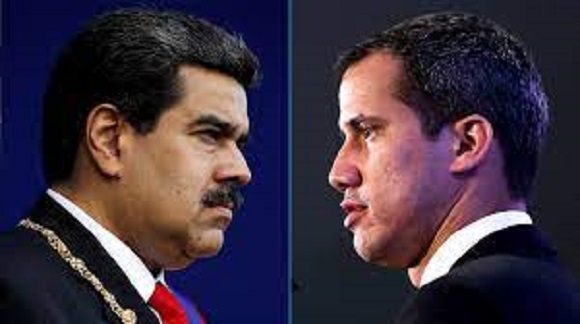RIO DE JANEIRO, BRAZIL – Juan Guaidó does not doubt that the opposition he leads in Venezuela would sweep an eventual election against President Nicolás Maduro. He is leading his efforts in the negotiation process in Mexico: to measure himself against Maduro as soon as possible.
Guaidó, 38, is recognized as president in charge of Venezuela by fifty countries, including the United States..
Read also: Check out our coverage on Venezuela
“I have said it from day one (…). If Maduro is afraid to measure himself against me, or if anyone else… I have no problem,” he challenges. “I challenge him, moreover, that he abandons (power) and I abandon (the so-called interim government), and that he measures himself,” Guaidó says in an interview with AFP in his apartment in Caracas.

“The origin of the conflict is the non-election of 2018, the conflict is a usurpation in the government… an election schedule that transforms an election into a real solution to the conflict is part of the process,” he reflects.
His main effort is focused on the presidential election, scheduled for 2024, to move forward as part of the dialogue table that started two weeks ago in Mexico, with the mediation of Norway and in which he uses as a bargaining chip the progressive lifting of the shrapnel of international sanctions that pressured the Maduro government to sit down to negotiate.
Would you be the candidate? “We are going to have a unitary candidate, a unity process”, he answers.
The advancement of the presidential elections, for now, is ruled out by Maduro. The opposition has the possibility of asking for a recall referendum next year when half of the president’s term is up.
“We can call it a presidential election, recall referendum, it would be a solution that attends the non-election of 2018, the one they owe all Venezuelans,” Guaidó argues.
He is confident that in “an election with confidence and a minimum of credibility (…) the democratic alternative would win 80-20, 70-30”. “I have no doubt”, he insists, dismissing polls that illustrate popularity in the doldrums.
Gone are the days when he gathered tens of thousands of people in rallies all over the country. The pandemic has finally cut down his already frayed convening power. In his house, which serves as his office, he is accompanied by two assistants and a couple of bodyguards.
THERE ARE NO CONDITIONS
When do you think this eventual presidential election should be held? “Already, in December… obviously as soon as possible”, Guaidó answers. “For Venezuelans, the presidential election is what resolves the conflict.”
However, he is skeptical about participating in the elections scheduled for this year of mayors and governors, organized by a new National Electoral Council (CNE) – with two opposition members – appointed as part of an internal negotiation process before Mexico.
“There are no conditions to call the event of November 21 an election, so much so that we are discussing (in Mexico) political and electoral guarantees and conditions”, he says, labeling the current CNE as “tutelary”.
But unlike previous elections, he avoids calling for abstention. “It is going to be a mixture, looking for the greatest mobilization, organization, and unity possible”, he points out without showing a clear position.
Will he vote that day? “I haven’t decided yet”.
The November regional elections have evidenced the cracks in the opposition, with many leaders breaking ranks to start campaigning against the fierce machinery of Chavismo and its already defined candidates.
The deadline to register candidacies expires on Sunday.
CONSTANT CONTACT
Guaidó assures that his contact with the United States is “constant” even with the government of Democrat Joe Biden, who, although he has maintained the support given to him by his predecessor Donald Trump, does not share the “all or nothing” strategy.
Trump led the international escalation to pressure Maduro’s downfall, with sanctions including an oil embargo.
The punitive measures, unpopular among Venezuelans, have not diminished the power of the Chavista leader, who maintains territorial control with the armed forces, his main support, and allies such as Cuba, China, Russia, and Iran.
The Biden administration, for example, welcomed the appointment of the new CNE and is considering the option of lifting some sanctions if the Mexican negotiations prosper.
“For those who support Maduro, there is no better option than an agreement” in Mexico “because it implies the progressive lifting of sanctions”, he points out. An eventual negotiation failure “will deepen the conflict, there will be more pressure and more international accompaniment”.
Maduro called last week for a “direct dialogue” with Washington that includes the return of chargés d’affaires in the embassies of both countries.
For Guaidó, it is a “desperate cry for some recognition”, whose “solution” is a “free and fair” election. “If the regime or Maduro wants some recognition or legitimacy, it has to win it with votes,” he finishes.

